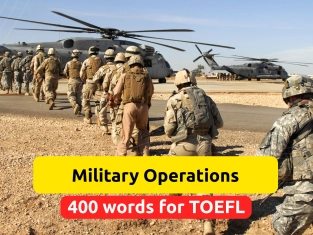by PushtoLearn
War and Conquest
Table of Contents
War and Conquest Flashcards - Vocabulary Practice for TOEFL
These exercises focus on War and Conquest Vocabulary
List of War and Conquest Words for the TOEFL
|
Word |
Definition |
Example |
|
Annex |
To take control of a territory or area, often by force. |
The country decided to annex the neighboring region after the conflict. |
|
Apex |
The highest point or peak. |
The empire reached its apex under the rule of the renowned king. |
|
Collapse |
To fall or break down suddenly. |
The empire collapsed due to internal corruption and external attacks. |
|
Conquest |
The act of conquering or gaining control of a place or people. |
The conquest of new territories expanded the empire's influence. |
|
Devise |
To plan or invent something carefully. |
The general devised a strategy to outmaneuver the enemy forces. |
|
Invasive |
Tending to intrude or spread aggressively. |
The invasive army captured several key cities in a matter of days. |
|
Prevailing |
Most common or dominant at a particular time. |
The prevailing attitude among the population was one of resistance. |
|
Resist |
To fight against or oppose something. |
The citizens resisted the invading forces for months before surrendering. |
|
Severely |
To an extreme degree or harshly. |
The soldiers were severely punished for disobeying orders. |
|
Violation |
The act of breaking a law, rule, or agreement. |
The invasion was seen as a violation of international treaties. |

Usage in TOEFL Exam Formats
Reading Section
-
Words like collapse, violation, and prevailing frequently appear in passages about historical events or political strategies.
-
Example Question: What does the author imply about the prevailing circumstances that led to the empire’s collapse?
Listening Section
-
Terms such as devise, resist, and annex are commonly used in lectures on history or international relations.
-
Example: “The army devised an innovative plan to resist the invasion.”
Writing Section
-
Use advanced words like severely, invasive, and conquest to demonstrate vocabulary proficiency in essays.
-
Example Sentence: “The violation of peace agreements severely undermined diplomatic relations.”
Speaking Section
-
Employ terms like apex, collapse, or resist to articulate ideas during speaking tasks.
-
Example: “The conquest of neighboring territories brought the empire to its apex of power.”
Common Mistakes
-
Confusing "Annex" with "Announce":
-
Mistake: "The leader annexed a new policy to the citizens."
-
Correction: "The leader announced a new policy, but annex is used for territory."
-
Overgeneralizing "Apex" to Mean All Peaks:
-
Mistake: "The apex of the mountain was easy to climb."
-
Correction: "The apex of the empire refers to its peak of influence, not a physical mountain."
-
Misusing "Severely" for Moderate Situations:
-
Mistake: "The weather was severely cold in autumn."
-
Correction: "The weather was mildly cold in autumn; severely indicates extreme conditions."
-
Using "Invasive" for Non-Aggressive Contexts:
-
Mistake: "The new rules were invasive to students’ time."
-
Correction: "The new rules intruded on students’ time; invasive is typically used for aggressive or unwanted intrusion."
-
Confusing "Violation" with "Violence":
-
Mistake: "The violation broke out suddenly during the protests."
-
Correction: "The violence broke out suddenly during the protests; violation refers to breaking laws or agreements."
FAQ
What does "annex" mean in a political context?
"Annex" refers to taking control of a territory, often through force or formal declaration, typically in a military or political context.
How is "apex" used in discussions about history?
"Apex" describes the peak or highest point of power, influence, or success, such as an empire at its strongest.
What’s the difference between "resist" and "oppose"?
"Resist" implies actively fighting against something, often with physical or strategic effort, while "oppose" can be more passive or ideological.
Why is "violation" significant in political essays?
"Violation" highlights breaches of agreements, laws, or rules, essential in discussions of international relations or ethical dilemmas.
Can "collapse" refer to something other than buildings or structures?
Yes, "collapse" can describe the sudden failure of systems, organizations, or governments, such as the collapse of an empire.

